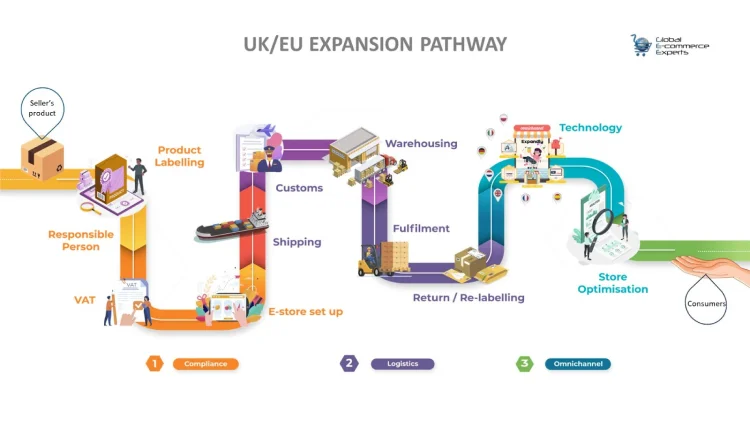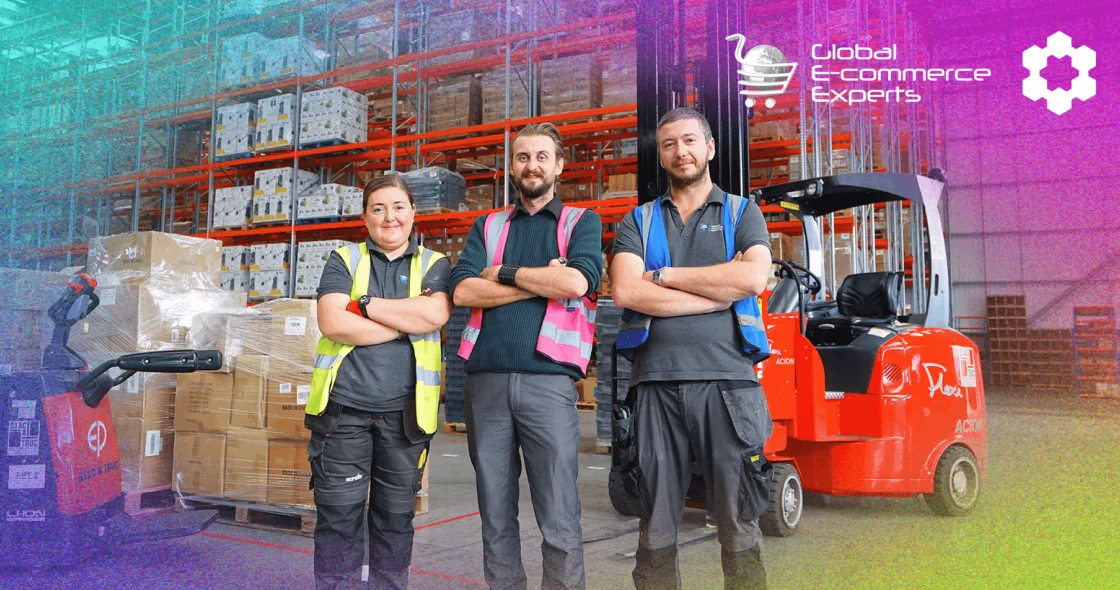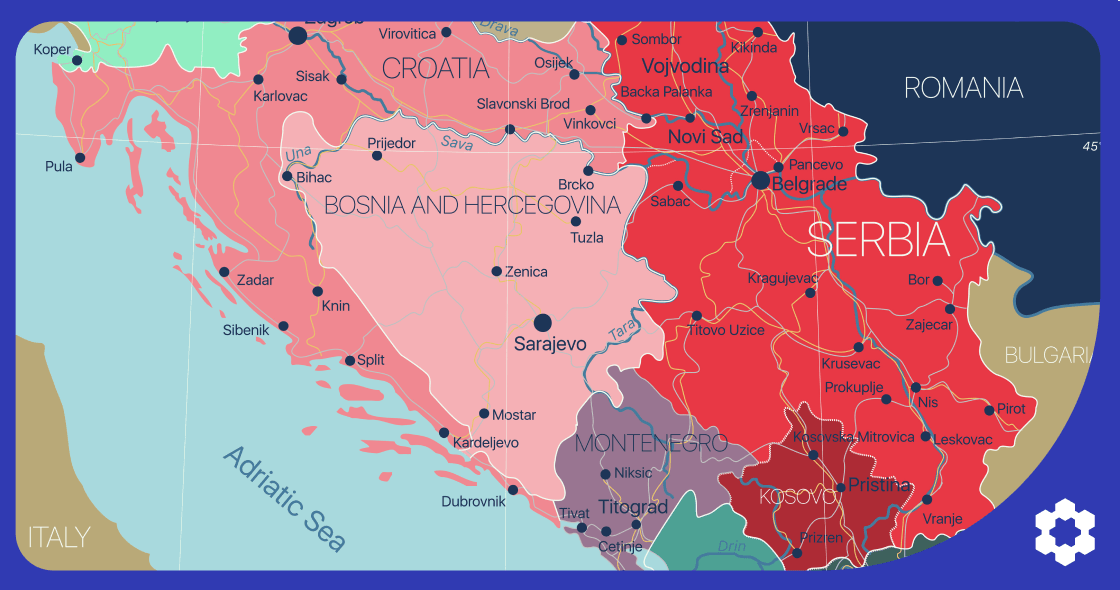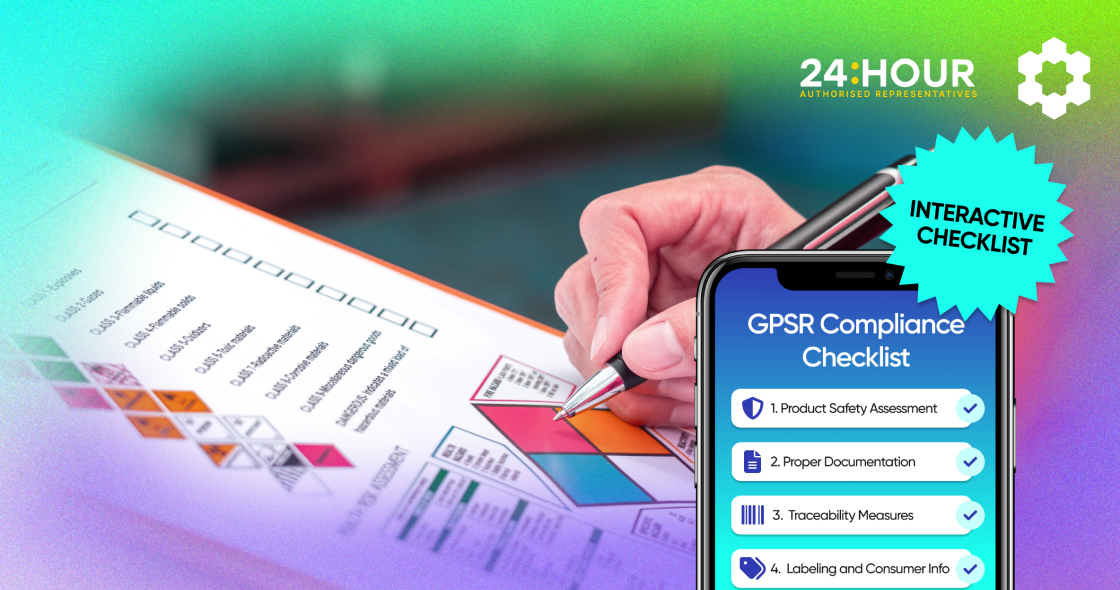Global ecommerce is teeming with opportunities, with an estimated growth rate for 2023 at 8.9%, propelling worldwide online sales to a staggering $5.8 trillion.
For US sellers looking at global expansion, the UK and European Union (EU) markets offer an enticing prospect. However, misconceptions and apprehensions often deter sellers from venturing overseas.
In this article, we’ll explore European expansion for Amazon sellers, address common concerns hindering international ecom growth, highlight the market potential, and offer solutions for success.
What is Global Expansion and How Does it Work?
In ecommerce expansion, businesses face a choice between local and global scales. Local expansion focuses on growing within existing regions, while global expansion means venturing into entirely new markets, often across countries or continents. The decision depends on your business’s readiness and objectives, balancing gradual local growth with ambitious global reach.
Ecommerce global expansion means replicating your successful business model and planting it in new countries, regions, and even continents. It is about taking what works in your home market and striving for the same triumph in diverse locales, engaging with fresh markets and broader audiences.
Typically, global expansion becomes a logical and strategic step once your business is firmly established in its domestic market.
The benefits of global expansion are compelling:
- Potential to craft a globally recognized brand and maximize revenue
- Helps mitigate risks associated with reliance on a single market
- Diversifies income sources across various markets and product lines
The avenues for expansion online are diverse, offering strategic flexibility. Sellers can leverage established online marketplaces like Amazon or they can opt for the independence of their ecommerce websites. The world is at your fingertips.
Why Do Sellers Hesitate to Expand into the EU/UK Market?
Below are the eight of the most common misconceptions that often leave US sellers hesitant to take the plunge. These include both the challenges specific to EU/UK expansion and the potential drawbacks associated with global expansion as a whole.
- Complexity of Service Providers: Expanding into Europe can seem like a labyrinthine task, involving coordination with multiple service providers across various aspects of the business.
- VAT Confusion: The Value Added Tax (VAT) system in Europe is renowned for its complexity, and US sellers often feel overwhelmed by the intricacies of taxation.
- Product Testing Maze: Products destined for European markets often require extensive testing and compliance checks different to the rest of the world, a daunting prospect for sellers.
- Logistical Hurdles: Brexit introduced new complexities in terms of shipping, customs clearance, and warehousing, adding to the perceived logistical challenges.
- Regulatory Variations: The UK and EU have distinct regulatory frameworks different from the rest of the world, which can be challenging to navigate for businesses unfamiliar with these markets.
- Amazon Account Management: Managing an EU/UK Amazon account differs significantly from the US market, creating uncertainties and concerns.
- Cost Considerations: The perceived high costs associated with European expansion can deter businesses from taking the plunge.
- Limited Bandwidth: Many sellers worry about having the necessary resources, both in terms of capital and manpower, to execute a successful expansion into the European market.
Top Amazon Global Expansion Strategies for Clearing the Path Forward

Now that we’ve identified the most common concerns and misconceptions that stop US sellers from seizing the European market, let’s discuss how each of them can be addressed, paving the way for a smoother expansion process.
1. Compliance: Navigating the Regulatory Landscape
Product Labeling
EU and UK product labeling standards differ from those in other parts of the world, often characterized by their strictness. However, the extent of testing required varies depending on the product category.
Surprisingly, certain products like electronics may require less testing than anticipated, while others may necessitate specific tests within the EU or UK. Notably, the wording on product labels directly influences the product’s categorization. For example, phrases like “Heal your back pain” or “Improve your blood pressure” can transform a supplement product into a medical one.
Sellers need expert guidance to determine the product’s category, assess the need for label modifications, additional testing requirements, and precise recommendations on where to conduct these tests.
Appoint a Responsible Person
A Responsible Person (RP) is an individual or entity appointed to represent you and ensure product compliance with legal and regulatory requirements within the EU and UK.
Designating an RP for your business in compliance with EU or UK regulations is a fundamental requirement of your expansion into the region.
All products requiring a CE mark in the EU and UK will require a RP from 2024. Amazon has made the decision to stop their RP service by March 31, 2024. If Amazon was your RP, finding an alternative is mandatory.
Amazon will be required by law to deactivate sellers’ CE marked offering that lack a RP from 1st April 2024.
The requirements for a representative may differ depending on the nature of your products and their categorization. Some of them can be mandatory. The same experts who provide you with labeling advice are well-equipped to guide you on whether your products necessitate a designated RP with specific qualifications or certifications.
Ideally, your RP should be the same individual handling your product labeling because they would already have all the necessary documentation in their possession.
Some of the key responsibilities of an RP include:
- Securing a local EU/UK physical address that must be displayed on your product packaging
- Acting as your primary point of contact and representation when it comes to dealing with local authorities in the EU/UK and registering your products.
- Conducting due diligence checks and ensuring that your business consistently observes full compliance with EU/UK regulations. This diligent oversight provides you with a hassle-free pathway for selling your products in the European market, giving you peace of mind and a solid foundation for a successful expansion.
Value Added Tax (VAT) Management
Navigating VAT regulations in the EU and UK presents unique challenges distinct from taxation systems in other regions. It is influenced by various factors, including where sellers store their goods, the platform they choose to sell on, and the value of each unit they transact.
Extended Producer Responsibility (EPR)
Extended Producer Responsibility (EPR) is an environmental policy that makes manufacturers responsible for the entire life of their products. This means they handle recycling and disposal. It’s all about reducing waste and encouraging sustainable product design. EPR varies by location but aims to make manufacturers more environmentally accountable. It helps cut waste and pollution and promotes greener products.
Complying with EPR regulations in Europe can be a complex task. The requirements vary depending on the types of products your business handles. It’s important to understand that EPR obligations are not the same for all products, and they even differ between countries.
Sometimes, a single product can fall into multiple EPR categories. For example, a singing teddy bear wearing a skirt could be classified under batteries, textiles, toys, and packaging.
It’s worth noting that for certain product types, EPR requirements may be less extensive than initially thought. Plus, the cost of EPR is relatively modest when compared to other expenses, so it shouldn’t deter your expansion plans. To effectively navigate EPR regulations, it’s crucial to determine the specific obligations for your product categories and develop a targeted EPR strategy.
2. Logistics: Mastering the Art of Efficiency
Efficient Shipping
When it comes to shipping, one critical aspect that sellers often overlook is documentation. This includes essential items like packing lists, commercial invoices, commodity codes, and tax calculations, etc. Providing incorrect information can lead to the need for revisions and potential customs delays. Fortunately, sellers can easily become familiar with this process and it typically only takes a few tries to get it right.
Strategic Warehousing
Now that the UK has left the EU customs area, it is vital to treat the UK and the EU as separate marketplaces. Consider working with a RP service who can help you establish strategically positioned warehouses in the UK and EU to optimize your distribution operations.
Storing goods in the Netherlands, for instance, can significantly reduce distribution costs when serving other European countries. This strategic placement ensures smoother logistics and cost savings for your business.
3. Online Distribution/Omnichannel: Leveraging software
Thinking Big in Europe
When operating in Europe, it’s essential to think expansively and target a wide range of countries. The proximity of European countries allows you to keep your inventories moving within the continent, seizing the maximum opportunity for sales.
Additionally, it’s beneficial to sell on local platforms in each country you target. However, managing multiple listings across various channels or platforms can become complex. To streamline this process, consider using apps designed to facilitate and simplify cross-channel management.
Learn more in our blog: Mastering Ecommerce Marketplace Management: A Guide to Cross-Marketplace Control and Monitoring.
Local Market Adaptation
Adapting your product listings to resonate with local markets is critical for success. In this regard, technology or third-party service plays a pivotal role in ensuring that your listings are not only accurate but also appealing to your target audience. Utilizing software solutions can help you achieve this and make your online distribution efforts more effective.
Make the most of the localized marketplaces with Amazon advertising support from PPC Entourage, serving US, Canadian, UK, and some European markets.
4. Business Capacity: Streamlining Service Providers
Managing multiple service providers can be a time-consuming process, which can be a significant drawback for businesses in terms of both capital and manpower.
Expanding your business necessitates a substantial allocation of resources. EU/UK Compliance partners like GEE recognize the importance of achieving a strong ROI when expanding into the EU/UK market. This is why an all-in-one package designed to simplify EU/UK expansion is essential.
With this service, all the concerns and solutions mentioned above can be addressed under a single umbrella. Even if you have limited manpower, an effective partner can ensure that your expansion is economically viable and makes sense from a business perspective.
European Market Opportunities: A Pot of Gold
As you venture into the realm of global expansion, it’s essential to recognize the boundless potential that awaits you in European markets. These opportunities align seamlessly with the broader landscape of global ecommerce growth, underlining the significance of this strategic move.
- Global Ecommerce Market Size: Europe offers access to a staggering 590 million consumers, representing a massive slice of the global ecommerce pie.
- Cultural Diversity: Europe’s cultural diversity paints a rich tapestry of consumer preferences. This translates into a vast array of niche markets and specialized product demands. By understanding and catering to these diverse tastes, businesses can broaden their product range and secure a prominent position within these markets.
- Logistical Advantage: Work with a partner with strategically positioned warehouses to achieve a logistical advantage that extends beyond the European borders. This efficient infrastructure ensures that products reach customers faster and more cost-effectively, enhancing the overall competitiveness of your business on a global scale.
- Language Advantage: Entering the UK market should be relatively straightforward for US sellers due to the language advantage. It’s significantly simpler to adjust product listings and craft messaging that resonates effectively.
- Amazon Global Expansion strategy: As part of your European expansion strategy, leveraging Amazon’s extensive international reach can be a game-changer. Amazon’s global footprint acts as a conduit to reach customers in new territories, expanding your market reach and bolstering your brand’s presence on a global scale.
Seize the European and Global Ecommerce Expansion Opportunity
Expanding into the European markets may appear daunting, but with the right partner and a clear strategy, your business can thrive in these lucrative territories. Don’t let misconceptions hold you back from seizing the incredible opportunities that these markets offer. In the end, success belongs to the entrepreneurs who can overcome the obstacles that others can’t.
By partnering with a professional European Compliance service provider like GEE, not only do you unlock the potential of the European ecommerce landscape but also position yourself for global expansion.








